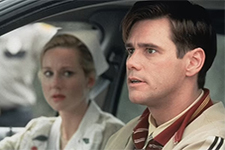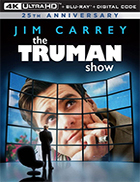The Truman Show (4K UHD)
|  Peter Weir’s masterful The Truman Show is a prophetic comedy of ideas that hit all too close to home in our media-savvy, television-obsessed, celebrity-enthralled times. In the film’s bizarre, but ultimately tenable fantasy world, a young man named Truman Burbank (Jim Carrey) has just reached his 10,909th day of life, every one of which has been (unknown to him) broadcast on live television all over the world. Truman is the unwitting star of The Truman Show, the greatest show on earth—a quasi-combination of soap operas and reality TV. The show’s creator, the pompously named Christof (Ed Harris), is a megalomaniacal television genius (at one point in the film he is referred to as a “televisionary”) who is as controlling as he is private (it isn’t too hard to imagine him becoming another reclusive Howard Hughes). The Truman Show is Christof's baby; he created it from the ground up, starting with just one camera in Truman’s mother’s womb and eventually expanding to more than 5,000 probing lenses all over the idyllic, but artificial town of Seahaven, the sunny island community where Truman resides and works as an insurance salesman. He fancies himself the God of the world he has created inside the largest studio ever built, which, along with the Great Wall of China, is the only human-made structure visible from space. Seahaven is a surrealistic relic of the 1950s as portrayed in TV shows like Leave It to Beaver, where everyone says “hello” to everyone else, husbands happily go off to work while their Stepford Wives stay at home with aprons, and everything is bathed in the unnaturally perfect light of a false sun. The deceptively simple story follows Truman as he slowly begins to realize that something in his world is amiss. He doesn’t realize that everyone around him is an actor, including his smiley wife Meryl (Laura Linney), his best friend Marlon (Noah Emmerich), and all those people he sees on the street every day. Little does he know that, in effect, the entire world he knows revolves strictly around him. And, until some technical mishaps occur, Truman has had no reason to suspect the abnormality of his existence. Christof has designed a number of intricate means to ensure that Truman never leaves the island of Seahaven, so he has no clue as to what the rest of the world is like, except what he sees on television and reads in the newspaper. Of course, all the media are controlled by Christof, so the front page of the paper declares in bold headlines that another study has deemed Seahaven the greatest place to live in America, and the TV flickers with shows that reinforce the benefits of small-town community. As Christof puts it all too correctly, we have no reason to question the reality with which we are presented. This, of course, is the key to the underlying plea the movie makes: We should question our “reality.” While Truman is the ultimate incarnation of the victim of reality television, he is also symbolic of each one of us—all of us who readily accept everything we hear on the news, never question why celebrities are revered, never interrogate whatever political narrative is being spun, and rarely stop to contemplate if things could be better. We may feel the urge to snicker at Truman’s naïve acceptance of his “false” environment, which is stuffed with often absurd product placements, but in reality, he is no better off than the majority of us. Director Peter Weir, who had begun his career in his native Australia directing television movies and then feature films before emigrating to Hollywood in the mid-1980s does a magnificent job of rendering the counterfeit world of The Truman Show and all the people within it. Weir has always been a great character director with an extraordinary feel for time and place—from his haunting, poetic drama Picnic at Hanging Rock (1975), to the tense exhilaration of Master and Commander: The Far Side of the World (2003). Working with comedian/actor Jim Carrey, at the time best known for his manic, rubber-faced performances in films like Ace Ventura: Pet Detective (1994) and Liar Liar (1997), Weir makes Truman into a likable, sympathetic Everyman (it is easy to see shades of Jimmy Stewart in some of his mannerisms). Truman is, as his name phonetically suggests, a “true man” in the sense that he is genuine. As Christof explains, the world around him may be artificial, but Truman is real. For his part, Carrey does a fine job of toning down his comical antics and showing a real knack for dramatic acting, a skill he later confirmed with his excellent performances in Man on the Moon (1999) and Eternal Sunshine of the Spotless Mind (2004). There are a few instances where he reverts to the old Carrey style, but it is always within the confines of his character, so he still feels like Truman Burbank and not Jim Carrey. Much of his performance can probably be credited to Weir’s direction. After all, Weir is the man who made legitimate dramatic actors out of Harrison Ford (in 1985’s Witness) and Robin Williams (in 1989’s Dead Poets Society). Carrey’s performance shows that his earlier movies had only taken advantage of part of his talent; like Truman, there is more to Carrey than first meets the eye. The screenplay was written by Andrew Niccol, who also wrote and directed the previous year’s dystopian sci-fi film Gattaca, which posited a future where all people are controlled by their genetics. The theme in that film is similar to The Truman Show, except genetics have been replaced by the media. Some of funniest and most knowing scenes in The Truman Show involve not Truman himself, but the hooked viewers in the outside world, glued to their television sets, watching his life unfold. Although these viewers don’t realize it and probably don’t care, Truman represents the ultimate in the commodification of human existence. He is the logical extension of the reality television of the film’s era, especially MTV’s numerous incarnations of the ironically titled The Real World, where cameras tracked the lives of various young people as they resolved their problems and dilemmas. The Truman Show is the next step after Jenny Jones, Jerry Springer, Montel Williams, and every other talk show that wallows in making spectacle out of human problems, not in the name of bettering the participants and the viewers, but rather for the vicarious thrill of watching so-called reality. But, like The Truman Show, the “reality” of all these shows is still controlled by producers, directors, writers, and editors. It is marketed as reality, but it is not. This is where The Truman Show comes in: reality, but scripted so it fits all the necessary requirements for good entertainment. If Truman’s life becomes too boring, Christof can always adjust the script. In effect, what The Truman Show points out is one of the scariest truths of contemporary American society: We would much rather watch someone else’s life unfold on a screen than take care of our own.
Copyright © 2023 James Kendrick Thoughts? E-mail James Kendrick All images copyright © Paramount Home Entertainment | |||||||||||||||||||||||||||||
Overall Rating: 


 (4)
(4)


